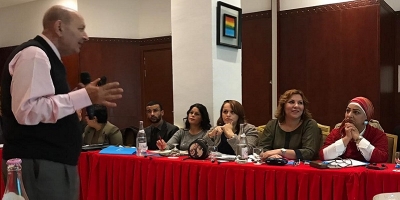
 Realizing a need for data on the state of the social service workforce and guidance on systematically strengthen this workforce regionally and nationally, the child protection and social policy sections of the UNICEF Regional Office and Country Offices in Middle East and North Africa have partnered with the Global Social Service Workforce Alliance and Maestral International to undertake a mapping and analysis. Selection of the countries was determined by the Regional Office based on the progress to date, interest of the national stakeholders and preparedness for the review expressed by the Country Offices. Countries implementing the review include: Djibouti, Iran, Jordan, Lebanon, Morocco, Palestine, Sudan and Tunisia.
Realizing a need for data on the state of the social service workforce and guidance on systematically strengthen this workforce regionally and nationally, the child protection and social policy sections of the UNICEF Regional Office and Country Offices in Middle East and North Africa have partnered with the Global Social Service Workforce Alliance and Maestral International to undertake a mapping and analysis. Selection of the countries was determined by the Regional Office based on the progress to date, interest of the national stakeholders and preparedness for the review expressed by the Country Offices. Countries implementing the review include: Djibouti, Iran, Jordan, Lebanon, Morocco, Palestine, Sudan and Tunisia.
Many of these countries have also already undertaken important steps towards such workforce strengthening, for example in Morocco, a repository was developed of social service workforce competencies.
To support the review, the Alliance has developed a questionnaire and a survey designed to gather quantitative and qualitative data to map the social service workforce. This includes also gathering data on education, supervision, training experiences and other areas prioritized in the currently developing UNICEF key indicators for social service workforce strengthening.
One respondent in Tunisia shared that “Our country has a very important history of developing and strengthening the social service workforce, including social workers as well as other categories of social service workers including psychologists. We must continue to work together to ensure their specific profession is fully recognised and respected, both at senior policy level as well as in terms of distinguishing social service professions from other professions such as medical and educational professions."
In each country the tools were translated and underwent language clarification and contextualization based on the local context and availability of data, as well as feedback from national stakeholders. With a goal of obtaining responses from multiple key stakeholder groups and at least 250 workers within the social service workforce in each country, the data is intended to provide a clear picture about the workforce nationally.
Following collection of data, led and supported by the key ministries and national stakeholder groups, national roundtable discussions are being held to help identify and agree on priority actions for strengthening and advocating for the social service workforce.
The work will culminate in a regional report providing an overview of the state of the social service workforce in the Middle East and North Africa. The report will be designed to inform the work of UNICEF and its national, regional and global partners to improve policies, programs, advocacy and knowledge generation related to the social service workforce in the region. The data will be included within the Alliance’s 2018 State of the Social Service Workforce Report, that will also include data from three other regions to provide a multi-regional review of trends and make recommendations for regional and global steps toward strengthening of the workforce. The mapping tool is among several tools that the Alliance is developing as part of a package of tools to support UNICEF country offices in national workforce strengthening efforts. Following roll out by UNICEF mid-2019, the toolkit will then be publicly available for social service workforce supporters to use within their programs.
